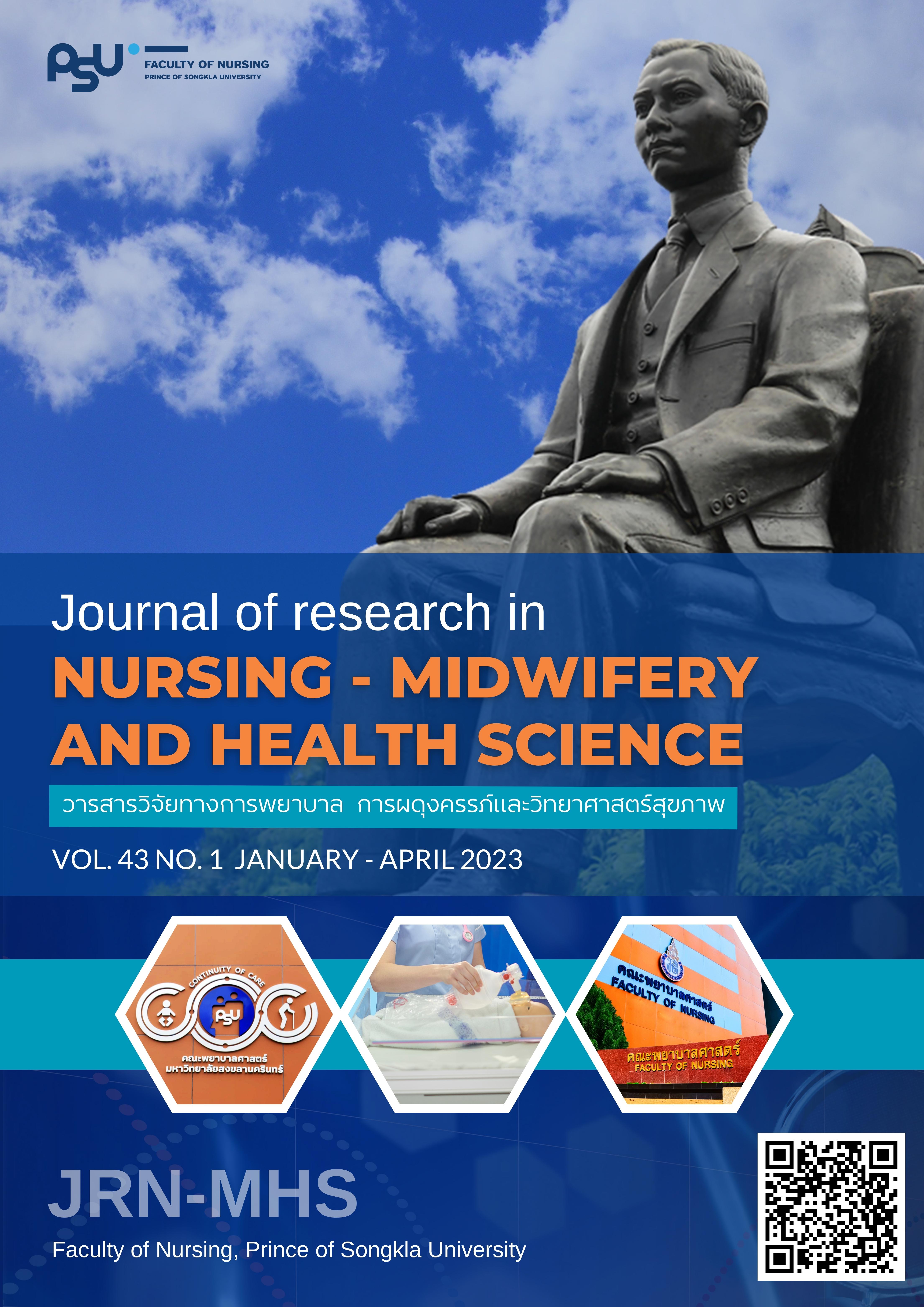ความสัมพันธ์ระหว่างความรู้ พลังสุขภาพจิต และแรงสนับสนุนของครอบครัวกับพฤติกรรมการจัดการตนเองของผู้สูงอายุโรคไตเรื้อรังที่ได้รับการฟอกเลือดด้วยเครื่องไตเทียม
Main Article Content
บทคัดย่อ
วัตถุประสงค์: ศึกษาความสัมพันธ์ระหว่างความรู้ พลังสุขภาพจิต และแรงสนับสนุนของครอบครัวกับพฤติกรรมการจัดการตนเองในผู้สูงอายุโรคไตเรื้อรังที่ฟอกเลือดด้วยเครื่องไตเทียม วิธีการ: เลือกกลุ่มตัวอย่างแบบเฉพาะเจาะจง จำนวน 103 คน เป็นผู้สูงอายุโรคไตเรื้อรังที่มาฟอกเลือดที่หน่วยไตเทียม โรงพยาบาลสังกัดกรมการแพทย์กรุงเทพมหานคร ได้แก่ โรงพยาบาลเลิดสิน โรงพยาบาลราชวิถี โรงพยาบาลสงฆ์ และมูลนิธิโรคไตแห่งประเทศไทย โรงพยาบาลสงฆ์ เก็บข้อมูล โดยใช้ 1) แบบบันทึกข้อมูลส่วนบุคคล 2) แบบประเมินพฤติกรรมการจัดการตนเอง 3) แบบทดสอบความรู้โรคไตเรื้อรัง 4) แบบประเมินพลังสุขภาพจิต และ 5) แบบสอบถามแรงสนับสนุนของครอบครัว ค่าความตรงเชิงเนื้อหาของเครื่องมือชุดที่ 2 ถึงชุดที่ 5 เท่ากับ 1 ค่าความเที่ยงของเครื่องมือแบบทดสอบความรู้โรคไตเรื้อรังมีค่าคูเดอร์ริชาร์ดสัน 20 เท่ากับ .81 แบบประเมินพฤติกรรมการจัดการตนเอง แบบประเมินพลังสุขภาพจิต และแบบสอบถามแรงสนับสนุนของครอบครัวมีค่าสัมประสิทธิ์แอลฟาครอนบาค .86 .95 และ .86 ตามลำดับ วิเคราะห์ข้อมูลของตัวแปรโดยสถิติเชิงพรรณนาวิเคราะห์ความสัมพันธ์ โดยสถิติสหสัมพันธ์ของเพียร์สัน และสถิติสหสัมพันธ์ของสเปียส์แมน ผลการศึกษา: กลุ่มตัวอย่างมีพฤติกรรมการจัดการตนเองในระดับสูง (M = 108.36, SD = 11.19) ความรู้ และพลังสุขภาพจิตมีความสัมพันธ์ทางบวกกับพฤติกรรมการจัดการตนเองอย่างมีนัยสำคัญทางสถิติ (r = .371, p < .001 และ r = .561, p < .001 ตามลำดับ) แรงสนับสนุนของครอบครัว ไม่มีความสัมพันธ์กับพฤติกรรมการจัดการตนเอง (rsp = .140, p > .05) สรุป: ผลการวิจัยเป็นข้อมูลพื้นฐานในการส่งเสริมผู้สูงอายุโรคไตเรื้อรังที่ฟอกเลือดด้วยเครื่องไตเทียมให้มีพฤติกรรมการจัดการตนเองเพิ่มขึ้น โดยให้ความรู้โรคไตเรื้อรัง และเสริมสร้างพลังสุขภาพจิต
Article Details

อนุญาตภายใต้เงื่อนไข Creative Commons Attribution-NonCommercial-NoDerivatives 4.0 International License.
เอกสารอ้างอิง
Cockwell P, Fisher LA. The global burden of chronic kidney disease. Lancet. 2020; 395(10225): 662-4. doi: 10.1016/S0140-6736(19)32977-0.
U.S. Department of Health and Human Services. Incidence, prevalence, patient characteristics, and treatment modalities [Internet]. Washington: U.S. Department of Health and Human Services; 2022 [cited 2022 Oct 11]. Available form: https://usrds-adr.niddk.nih.gov/2022/end-stage-renal-disease/1-incidence-prevalence-patient-characteristics-and-treatment-modalities.
Chuasuwan A, Lumpaopong A. editors. Thailand renal replacement therapy: Year 2020 [Internet]. Bangkok: The Nephrology Society of Thailand; 2020 [cited 2022 Jan 1]. Available from: https://www.nephrothai.org/wp-content/uploads/2022/06/Final-TRT-report-2020.pdf
The Nephrology Society of Thailand. 2018 manual of hemodialysis and plasmapheresis for kidney disease patients [Internet]. 2018 [cited 2022 Jan 1]. Available from: https://www.nephrothai.org/wp-content/uploads/2021/10/คู่มือการรักษาด้วยการฟอกเลือดและการกรองพลาสมาสำหรับผู้ป่วยโรคไต-2561.pdf
Arhuidese IJ, Cooper MA, Rizwan M, et al. Vascular access for hemodialysis in the elderly. J Vasc Surg. 2019; 69(2): 517-25.e1. doi: 10.1016/j.jvs.2018.05.219.
Hon K, Bihari S, Holt A, et al. Rate of catheter-related bloodstream infections between tunneled central venous catheters versus peripherally inserted central catheters in adult home parenteral nutrition: A meta-analysis. JPEN J Parenter Enteral Nutr. 2019; 43(1): 41-53. doi: 10.1002/jpen.1421.
Coluzzi F. Assessing and treating chronic pain in patients with end-stage renal disease. Drugs. 2018; 78(14): 1459-79. doi: 10.1007/s40265-018-0980-9.
Giglio J, Kamimura MA, Lamarca F, et al. Association of sarcopenia with nutritional parameters, quality of life, hospitalization, and mortality rates of elderly patients on hemodialysis. J Ren Nutr. 2018; 28(3): 197-207. doi: 10.1053/j.jrn.2017.12.003.
Han E, Shiraz F, Haldane V, et al. Biopsychosocial experiences and coping strategies of elderly ESRD patients: A qualitative study to inform the development of more holistic and person-centered health services in Singapore. BMC Public Health. 2019; 19(1): 1107. doi: 10.1186/s12889-019-7433-6.
Lin MY, Liu MF, Hsu LF, et al. Effects of self-management on chronic kidney disease: A meta-analysis. Int J Nurs Stud. 2017; 74: 128-37. doi: 10.1016/j.ijnurstu.2017.06.008.
Ryan P, Sawin KJ. The Individual and family selfmanagement theory: Background and perspectives on context, process, and outcomes. Nurs Outlook. 2009; 57(4): 217-25.e6. doi: 10.1016/j.outlook.2008.10.004.
Gela D, Mengistu D. Self-management and associated factors among patients with end-stage renal disease undergoing hemodialysis at health facilities in Addis Ababa, Ethiopia. Int J Nephrol Renovasc Dis. 2018; 11: 329-36. doi: 10.2147/IJNRD.S184671.
Cha J, Song Y. Positive emotions and self-management behaviors of patients undergoing hemodialysis. JHSTI. 2021; 1(2): 9-16. doi: 10.21742/JHSTI.2021.1.2.2.
Hafezieh A, Dehghan M, Taebi M, et al. Self-management, self-efficacy and knowledge among patients under haemodialysis: A case in Iran. J Res Nurs. 2020; 25(2): 128-38. doi: 10.1177/1744987120904770.
Song YY, Chen L, Wang WX, et al. Social support, sense of coherence, and self-management among hemodialysis patients. West J Nurs Res. 2022; 44(4): 367-74. doi: 10.1177/0193945921996648.
Mahanupab P, Chintanawat. R, Juntasopeepun P. Health literacy and self-management in older persons receiving hemodialysis. TJNC. 2022; 37(1): 108-24. Thai.
Ahmed FA. Kidney disease in elderly: Importance of collaboration between geriatrics and nephrology. Aging Dis. 2018; 9(4): 745-7. doi: 10.14336/AD.2018.0223.
Van de Velde D, De Zutter F, Satink T, et al. Delineating the concept of self-management in chronic conditions: A concept analysis. BMJ Open. 2019 Jul 16; 9(7): e027775. doi: 10.1136/bmjopen-2018-027775.
Babic R, Babic M, Rastovic P, et al. Resilience in Health and Illness. Psychiatr Danub. 2020; 32(Suppl 2): 226-32. PMID: 32970640.
Photharos N, Wacharasin C, Duongpaeng S. Model of Selfmanagement Behavior in People Experiencing Early Stage Chronic Kidney Disease. Pacific Rim Int J Nurs Res. 2018; 22(4): 360-71.
Kviz FJ. Conducting health research: Principle, process, and method. Los Angeles: Sage; 2020.
Aree-Ue S, Youngcharoen P. The 6-item cognitive function test-Thai version: Psychometric property testing. Rama Nurs J. 2020; 26(2): 188-202. Thai.
Brooke P, Bullock R. Validation of a 6-item cognitive impairment test with a view to primary care usage. Int J Geriatr Psychiatry. 1999; 14(11): 936-40.
Methakanjanasak N. Self-management of end-stage renal disease patients receiving hemodialysis. [dissertation]. [Chiang Mai]: Chiang Mai University; 2005. 212 p.
Klabklay W. Effects of health education on self-care behaviors of chronic renal failure patients with hemodialysis. [master’s minor thesis].[Bangkok]: Chulalongkorn University; 2001. 153 p.
Maneerat S. Development and psychometric evaluation of Thai elderly resilience scale. [dissertation].[Songkhla]: Prince of Songkla University; 2011. 214 p.
Malathum P. A model of factors contributing to perceived abilities for health-promoting self-care of communitydwelling Thai older adults. [dissertation].[Austin]: The University of Texas at Austin; 2001. 294 p.
Wongsaree C, Praneetham W. The study of relationship and factors influencing of dietary and fluid consumption among end stage renal disease patient receiving hemodialysis. JRTAN. 2018; 19(3): 117-25. Thai.
Wongsaree C. Factors predicting health self-management in end stage renal disease patient receiving hemodialysis in a private hospital, Thailand. JNSCU. 2018; 30(3): 66-77. Thai.
Saengtong J. Aging society (complete aged): The elderly condition of good quality. Rusamelae J. 2017; 38(1): 6-28. Thai.
Chen Z, Jiang Y, Chen M, et al. Resilience as a mediator of the association between spirituality and self-management among older people with chronic obstructive pulmonary disease. Healthcare (Basel). 2021; 9(12): 1631. doi: 10.3390/ healthcare9121631.
Mendoza-Pinto C, García-Carrasco M, Campos-Rivera S, et al. Medication adherence is influenced by resilience in patients with systemic lupus erythematosus. Lupus. 2021; 30: 1051-7. doi: 10.1177/09612033211004722.


